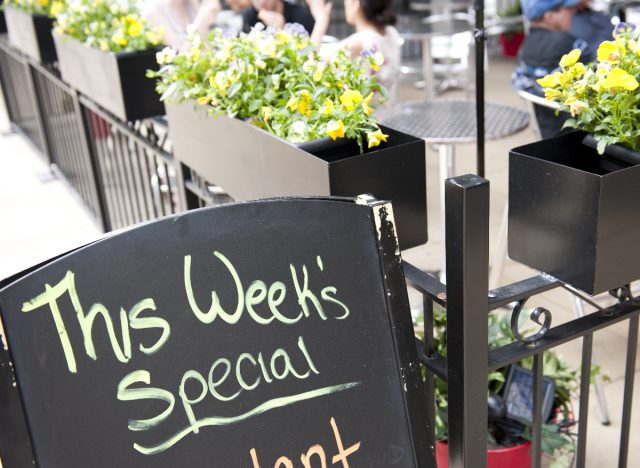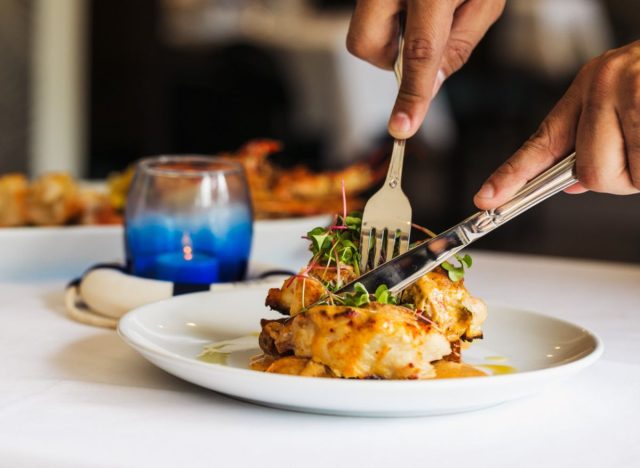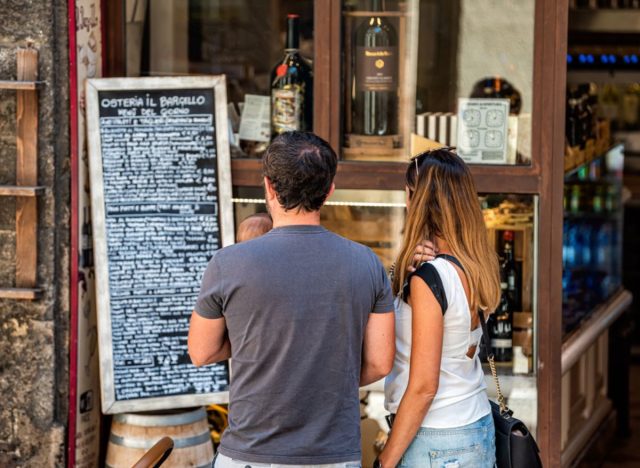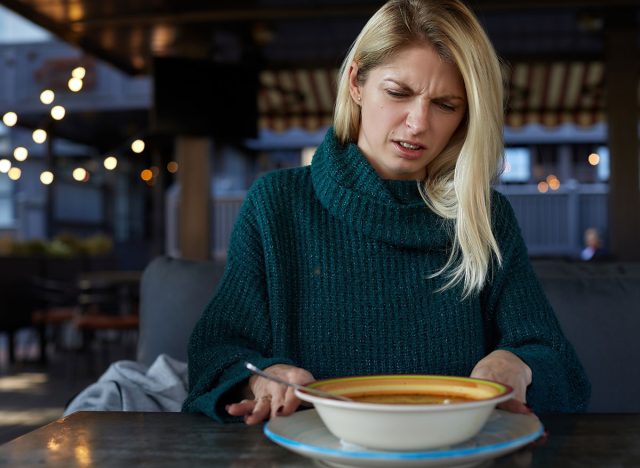7 Warning Signs You Should Skip the Special at a Restaurant, According to Chefs

Why do restaurants need specials? Are they really something “special” or just a way for chefs to either experiment or use up ingredients that may not be that fresh? Most important, should you go for it or skip the special? What are the signs that a special is, well, not all that special?
The answer is: It depends. While some restaurants, usually higher-end or busier ones, have specials that are genuinely delicious and are made with fresh ingredients, other restaurants offer specials just to help get rid of food that may not be that fresh.
To help you better determine whether or not ordering the special is really worth it, we enlisted experts to let us spot some warning signs of a suspect special. From specials that are only offered on certain days to signs a waiter is just upselling it for a larger tip, here are seven warning signs you should skip the daily specials, according to chefs.
The menu is already overloaded with other dishes

If you notice that a restaurant that already has a long list of dishes offers specials as well, you may want to proceed with caution.
“When it is a large menu, the restaurant tends to store a larger quantity of ingredients, since they can’t accurately predict how much of what may be needed within a given time period,” explains Hemant Bhagwani, chef and owner of the upcoming Goa New York in New York City.
Because of this, specials may be made up of older ingredients that weren’t used up in time in regular dishes. “An overloaded menu with different dishes shows the kitchen carries an excess inventory which leads to stale ingredients,” he adds.
The staff is overselling it

Bhagwani also points out that a red flag may be when restaurant staff tries too hard to push the special on you. If your server is doing this it may be because the kitchen is trying to sell a special that has ingredients in it that are going to go bad soon and they want to get it out of the kitchen fast.
It’s priced lower than regular menu items

Another sign to steer clear of the specials is when its prices are lower than regular menu prices. Restaurants will sometimes do this in hopes that more people will be enticed to order the special, therefore allowing them to get rid of leftover or older ingredients quicker.
“When the day special is priced lower, the diner needs to recognize this as a red flag,” Bhagwani says.
It’s offered as a lunch special

If a restaurant that is usually open for lunch or dinner is offering lunch specials, then that may be another sign that they are trying to get through older, less fresh ingredients.
“I’ve been told by a bunch of cooks at restaurants that ‘today’s special’ or ‘lunch specials’ are either the beginning of the week’s food, or last week’s food,” one Reddit user writes. “The restaurant is trying to get rid of it before it turns bad, and an easy way to do this is through lunch due to not a lot of people going out for lunch. If you saw a special, you’d be more inclined to go in and order it to ‘save money’.”
It seems like a “test dish”

If you notice that the special is a dish that seems out of the ordinary for the restaurant, you may want to rethink ordering it. This is because sometimes daily specials are actually different recipes and dishes that chefs are just testing out, which may mean that they might not be up to par yet.
“I honestly avoid the specials because often the specials are a test dish,” says Nahid Ahmed, chef and founder of Luthun in New York City. Ahmed mentions that because of this there’s a 50/50 chance that it actually tastes good.
“The chef may not have too much confidence in that dish and might be testing the waters a bit,” he adds. Ahmed says that it’s better to stick with what’s on the regular menu in this case.
It’s offered on a Tuesday, Wednesday, or Thursday (and it’s a less busy restaurant)

Chef Dennis Little, a professional chef for 40+ years and blogger at Ask Chef Dennis, recommends paying attention to which day specials are offered to figure out how fresh the ingredients are.
“When I created specials, most of the items for the specials were purchased specifically for that purpose and those food purchases generally came right before the weekend, which is traditionally a restaurant’s busiest time,” Little explains. “Most specials would sell out but those that didn’t would linger and while the food was not bad, it was not as fresh as when it was purchased. This is especially important with seafood and meats.” Specials that didn’t sell would either continue on as a special or worked into new specials or soups.
Because of this, Little advises that the best time to buy specials is Friday and Saturday, as it “would be the time the products used would be at their freshest.” He also advises avoiding most seafood items Tuesday through Thursday, unless the restaurant is always busy, as seafood may not be as fresh during these days.
“A restaurant that is slower during the week may not receive as many food deliveries and while the primary menu would always have the freshest choices, specials may be food that has been around longer,” he says.
It seems to be made of cheap ingredients

One Reddit user that worked at a restaurant explains that sometimes restaurants will throw together cheap dishes to put on the “specials” menu just to have specials available. Specials usually drive more traffic, which in turn means the restaurant could easily make more money. However, these dishes only seem like you’re getting a good deal.
“We did have a few low-cost dishes which came in and out of the ‘specials’ menu, to avoid having an empty ‘specials’ menu,” they write. “They were always low-cost, easily obtained ingredients.









